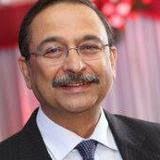One of the most hackneyed phrases is the 'Idea of India' It's the sort of thing that people pontificate about and generally there is a large dose of Mahatma Gandhi, Nehru and other bygone greats who are referred to in reverential terms whenever the topic comes up. If you were to try and involve the younger generation in any such conversation it would be met with a huge yawn. The fact is that this whole concept is mired in the baggage of the past - Nehruvian Socialism, State Control over Resources, License Raj and what have you. So much so that the kernel of what it really means has been lost in the rhetoric that surrounds it.
I have a thesis. That the real 'Idea of India' can be summed up in a very simple phrase and that is 'Common Sense' or 'Pragmatism'. There is also an element of assimilation and a tendency to avoid over reaction. In a nutshell it is this thought has allowed an ancient civilization to survive over the millenia while others have perished. As the poet Iqbal said:
Yunan-o-Misr-o-Roma sab mit gaye jahan se
ab tak magar Hai baki naam-o-nishan hamara,
Kuchh baat hai ke hasti mit’ti nahin hamari
Sadiyon raha hai dushman daur-e-zaman hamara
Translated this means, while the Greeks, Egyptians and Romans have all vanished, we are still here. There must be something special about us that we still exist despite the whole world being against us.
I think Iqbal may have got a bit carried away by the last line about the whole world being against us. On a lighthearted vein it may also be the origin of the 'foreign hand' so beloved of Indian Government agencies.
In the aftermath of independence our fledgling country was influenced and governed by Western Educated, Socialist Leaders. In the 20s and 30s when Nehru, Jinnah, Mahatma Gandhi and many other Indian leaders were educated in England socialist ideas held sway. Those were the heady days of the rise of the Soviet Union and it was by no means certain that Western Democracy would prevail over socialist thinking. In addition liberal notions of the equality of all men (and women) and the separation of religion from the state were prevalent and respected by the western educated elite. In this context, two things happened in independent India:
- State control over production and resources was the logical and pragmatic course of action given that private capital and entrepreneurship was in its infancy. The setting up of the Public Sector, Institutes of Higher Learning, National laboratories and so on was all part of this process. Much of this has been reviled and criticized in later years but if one was to step back in time to when these decisions were taken it is difficult to envisage what else could have been done.
- Western ideas of the way democracy would function (the Parliamentary Format) and the separation of religion from the state were implemented. It is interesting that Jinnah like his earlier comrades from the Congress started with similar objectives for Pakistan. It is a different matter that Pakistan changed course much earlier. In India today we are beginning to witness a revolt of sorts against many of these ideas as we will discuss later.
- The rise of the rural and semi urban population has led to shifting political alignments and changes in national priorities. It has also led to regional satraps who have a significant say on government policy. The Central Government has steadily lost power as it has had to accommodate regional aspirations. Today a Jayalalitha in Tamil Nadu or a Mamta Banerjee in West Bengal have far more traction in their states than the central leadership.
- Perhaps related to Point 1, there is a shift in attitudes such as a resurgence of overt religious practices and beliefs. The westernised middle class tends to downplay religion whereas the burgeoning rural and semi urban masses see it is a very real part of their lives. One sees this in attempts to prove the historicity of epics like the Ramayana and the Mahabharata and the attempts to rescue Indian history from the clutches of Marxist Historians. It is also reflected in the rise of politicians like Asauddin Owaisi who have come to represent the views of underprivileged Muslims.
- Parlimentary Democracy has become dysfunctional in all but name. I had earlier written about this phenomenon and had tried to establish that one of the reasons for this was the changing character of our parliamentarians. From suave Oxford and Cambridge educated gentlemen to a much more grassroots politician who has little time and patience for civilised debate.
- It may be argued that the Media has started driving public discourse to an unprecedented extent. Certainly even the mainstream parties are wary of the power that the media represents and treat some of the prima donnas with kid gloves.
Against all this there is a feeling that India is finally gaining its place in the sun. Our position in the global economy is steadily improving and with it the respect that we command. Our economy is growing steadily as millions are uplifted from poverty.
So what would be a possible outcome? Will the 'Idea of India' thrive and grow or will it wither in the corrosive stream of fascism? I for one, am very optimistic. Our ancient civilization has a habit of correcting itself. It has a habit of rejecting extremism and of building accommodation with the most diverse of ideologies. It would take far more than the provocations that we have seen in the recent past to derail India.
In some ways we are too big to fail.
